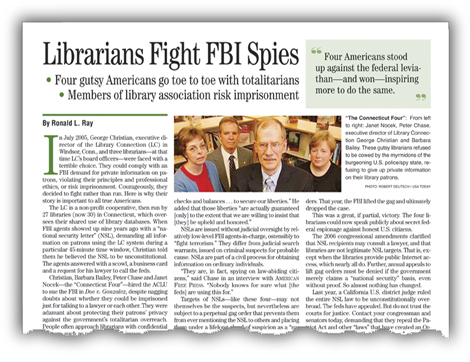
• Four gutsy Americans go toe to toe with totalitarians.
• Members of library association risk imprisonment.
By Ronald L. Ray —
In July 2005, George Christian, executive director of the Library Connection, Inc. (LCI) in Windsor, Conn., and three librarians—at that time LC’s board officers—were faced with a terrible choice. They could comply with a Federal Bureau of Investigation (FBI) demand for private information on patrons, violating their principles and professional ethics, or risk imprisonment. Courageously, they decided to fight, rather than run. Here is why their story is important to all true Americans.
LCI is a non-profit cooperative, then run by 27 libraries (now 30) in Connecticut, which oversees their shared use of library databases. When FBI agents showed up nine years ago with a “national security letter” (NSL), demanding all information on patrons using the LCI system during a particular 45-minute time window, Christian told them he believed the NSL to be unconstitutional. The agents answered with a scowl, a business card and a request for his lawyer to call the feds.
Christian, Barbara Bailey, Peter Chase and Janet Nocek—the “Connecticut Four”—hired the American Civil Liberties Union to sue the FBI in Doe v. Gonzalez, despite nagging doubts about whether they could be imprisoned just for talking to a lawyer or each other. They were adamant about protecting their patrons’ privacy against the government’s totalitarian overreach. People often approach librarians with confidential matters, such as personal health issues, that must be protected by professional ethics.
Why the lawsuit? There is “just too much power in the hands of one branch of government,” Christian told AMERICAN FREE PRESS, “without any of the checks and balances . . . to secure our liberties.” He added that those liberties “are actually guaranteed [only] to the extent that we are willing to insist that [they] be upheld and honored.”
NSLs are issued without judicial oversight by relatively low-level FBI agents-in-charge, ostensibly to “fight terrorism.” They differ from judicial search warrants, issued on criminal suspects for probable cause. NSLs are part of a civil process for obtaining information on ordinary individuals.
“They are, in fact, spying on law-abiding citizens,” said Chase in an interview with this reporter. “Nobody knows for sure what [the feds] are using this for.” By contrast, commented Bailey, “Privacy is at the heart of librarianship.”
Targets of NSLs—like these four—may not themselves be the suspects, but nevertheless are subject to a perpetual gag order that prevents them from ever mentioning the NSL to others and placing them under a lifelong cloud of suspicion as a “national security threat.”
The “anti-terrorism” NSL is itself a form of terrorism, issued tens of thousands of times each year, with nearly no useful results.
At trial, the judge declared NSLs unconstitutional. As the appeals court, in 2006, appeared ready to uphold the ruling, Congress amended the USA PATRIOT Act to allow judicial appeal of NSL gag orders. That year, the FBI lifted the gag and ultimately dropped the case.
This was a great, if partial, victory. The four librarians could now speak publicly about secret federal espionage against honest U.S. citizens.
The 2006 congressional amendments clarified that NSL recipients may consult a lawyer, and that libraries are not legitimate NSL targets. That is, except when the libraries provide public Internet access, which nearly all do. Further, annual appeals to lift gag orders must be denied if the government merely claims a “national security” basis, even without proof. So almost nothing has changed.
However, LCI’s partial victory is critically important, as Edward Snowden’s National Security Agency revelations make clear. Today, the federal Suspicious Activity Reporting program allows anonymous reporting of innocent activities, like photographing outdoor art, as possible “terrorism.” And loopholes in other laws allow nearly unlimited spying on Americans, without oversight, whenever their communications cross the border, e.g., when Google stores e-mails on mirror servers overseas.
Without the fearless efforts of the “Connecticut Four,” Americans would still be in the dark about primary means the federal government uses to spy on citizens, violating the Constitution and our natural right to remain free of totalitarian government coercion.
Last year, a California United States District Judge ruled the entire NSL law to be unconstitutionally over-broad. The feds have appealed. But do not trust to the courts for justice. Contact your congressman and senators today, demanding that they repeal the USA PATRIOT Act and other “laws,” which have created an Orwellian tyranny in the “land of the free.”
Ronald L. Ray is a freelance author and an assistant editor of THE BARNES REVIEW. He is a descendant of several patriots of the American War for Independence.



Many in the world fight FBI/CIA dirty spies.
But for government snoops? Absolutely not! And what would be the point? It’s not like the local library is a warehouse for terrorist information training!
I wonder home many other agents will be at the other end of that colonoscopy when I get my colon checked?